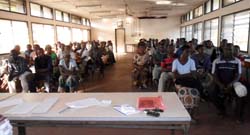Preparations for N2Africa 2011/12 growing season commenced on 1st July 2011 in Malawi. The IITA/CIAT team began with sensitization meetings with farmers in almost all the project sites and the activity is still ongoing. The sensitization meetings covered several topics including capacity building of farmer groups, demonstration plots, supervision and data collection, monitoring and evaluation and marketing.
On marketing, N2Africa has linked up with the CIAT lead and IFAD funded project “Increasing smallholder farm productivity, income, and health through widespread adoption Integrated Soil Fertility Management (ISFM) in the Great Lake Regions and Southern Africa” and has planned to link farmers to output markets for the legume crops being promoted (soyabean, groundnuts, common bean and cowpea). Improved farmer – market linkages should provide an incentive for farmers to adopt legume crop production technologies being promoted under N2Africa. This will also improve the livelihood of farmers through increased incomes realized from the market links. Farmers have also been encouraged to form marketing groups so that they can market their produce collectively.
 |
A cross section of farmers captured during the sensitization meeting in Salima, Chingiuluwe EPA. July, 2011 |
As a first step on market linkages, CIAT in collaboration with IITA conducted an assessment of legume quality specifications which are demanded by buyers in various markets. This was done prior to the sensitization/planning meetings with farmers. The idea for the assessment was to prepare farmers to meet the market demands through training. It was also an opportunity to start discussing with buyers on the possibility of contract farming with the farmers under N2Africa.
The assessment revealed that the legume crops which are being promoted by the project have a readily available market in Malawi. Most of the buyers visited indicated that they buy large quantities of these legumes each year. They also indicated that farmers can directly access the output markets.
The project has already had some success in market linkages. About 110 farmers from Dowa have been registered to produce groundnuts and soyabean seed for NASFAM on contract. It is expected that the contract with NASFAM will be finalized by the end of September 2011.
The project has also registered some farmer groups with a Market Information System called Esoko (www.esoko.com – operational in eight countries in Africa) which provides market information (commodity prices, interested buyers) through text messages sent to mobile phones. More farmer groups will be registered with Esoko this season.
Brenda Soho (CIAT) and Anne Turner

